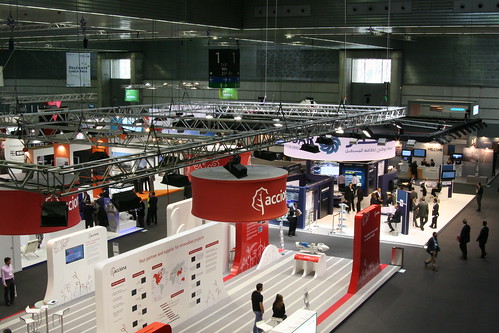
Photo credit Unhindered by Talent
Here is this Friday’s Green Numbers round-up:
-
Iberdrola Renovables Buys Spain?s Largest Wind Park (Update1) – BusinessWeek
Iberdrola Renovables SA, the world?s largest operator of wind parks, agreed to buy Spain?s largest wind farm from Gamesa Corporacion Tecnologica SA.
Renovables, based in Valencia, paid Gamesa 320 million euros ($441 million) for 244 megawatts of power capacity in Andevalo, Spain
-
IBM recently ran a ‘Jam’ – an online discussion – on environmental sustainability and why it is important for CIOs, CEOs and CFOs to address it. The Jam involved thousands of practitioners and subject matter experts from some 200 organisations. It focused primarily on business issues and practical actions.
Take a look at the check list below and it becomes rapidly apparent, C-level management need to tackle the issue before it is foisted upon them.
IBM’s Institute for Business Value will fully analyse the 2080 Jam contributions, but this is the essential CIO checklist derived from comments made during the Eco-Jam.
-
HP Opens it’s First 100% Air-Cooled Data Center
Data centers are, thankfully, getting a lot of attention when it comes to making them more efficient. Considering that roughly 60% of the electricity used at a data center goes to keeping the servers cool, focusing on smart cooling tactics is essential. HP has taken this to heart and has opened it’s first wind-cooled data center, and it’s the company’s most efficient data center to date.
In this piece, HP claims that their data center is the world’s first wind-cooled data center – I’m not sure just how valid this is as I have heard BT only do wind-cooled data centers!
-
Branson warns of oil crunch within five years | Business | The Guardian
“Sir Richard Branson and fellow leading businessmen will warn ministers this week that the world is running out of oil and faces an oil crunch within five years.
The founder of the Virgin group, whose rail, airline and travel companies are sensitive to energy prices, will say that the ?coming crisis could be even more serious than the credit crunch.
“The next five years will see us face another crunch ? the oil crunch. This time, we do have the chance to prepare. The challenge is to use that time well,” Branson will say.”
-
Topsoil could vanish in 60 years, says study – 04 Feb 2010 – BusinessGreen.com
“Fertile soil is being lost faster than it can be replenished making it much harder to grow crops around the world, according to a study by the University of Sydney.
The study, reported in The Daily Telegraph, claims bad soil mismanagement, climate change and rising populations are leading to a decline in suitable farming soil.
An estimated 75 billion tonnes of soil is lost annually with more than 80 per cent of the world’s farming land “moderately or severely eroded”, the report found.
Soil is being lost in China 57 times faster than it can be replaced through natural processes, in Europe 17 times faster and in America 10 times faster.
The study said all suitable farming soil could vanish within 60 years if quick action was not taken, leading to a global food crisis.”
-
Chevron hires twelve public relations firms to discredit indigenous Indians in Ecuador
In response to an environmental lawsuit filed against the oil giant, Chevron has fortified its defenses with at least twelve different public relations firms whose purpose is to debunk the claims made against the company by indigenous people living in the Amazon forests of Ecuador. According to them, Chevron dumped billions of gallons of toxic waste in the Amazon between 1964 and 1990, causing damages assessed at more than $27 billion.
-
Joint venture plans 13GW renewables project in India
Indian mobile phone and commodity export firm Airvoice Group has formed a joint venture with public sector body Satluj Jal Vidyut Nigam to build 13GW of solar and wind capacity in a sparsely populated part of Karnataka district in south west India.
The joint venture is budgeting to invest $50 billion over a period of 10 years, claiming it to be the largest single renewable energy project in the world.
-
Each Ton of CO2 Worth $40 in Health Costs : CleanTechnica
Using coal for electricity produces CO2, and climate policy aims to prevent greenhouse gases from hurting our habitat. But it also produces SOx and NOx and particulate matter that have immediate health dangers.
A University of Wisconsin study was able to put an economic value on just the immediate health benefits of enacting climate policy. Implications of incorporating air-quality co-benefits into climate change policymaking found coal is really costing us about $40 per each ton of CO2.
Posted from Diigo. The rest of my favorite links are here.

